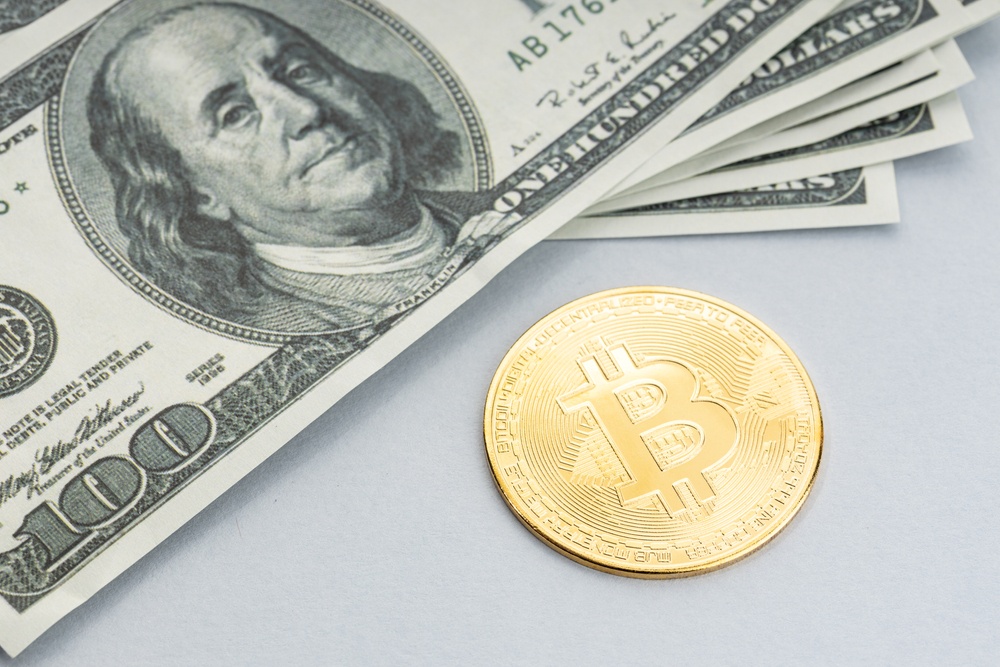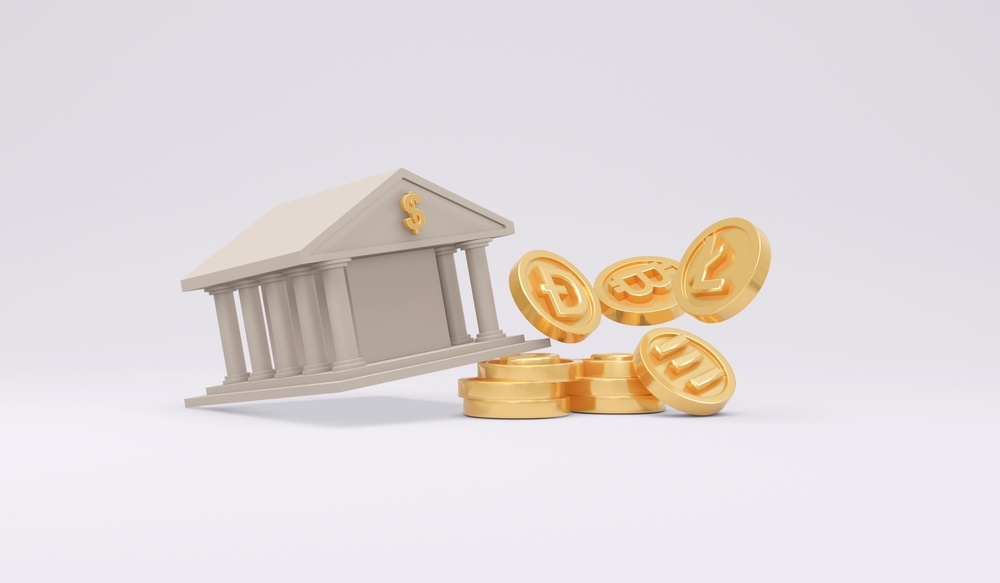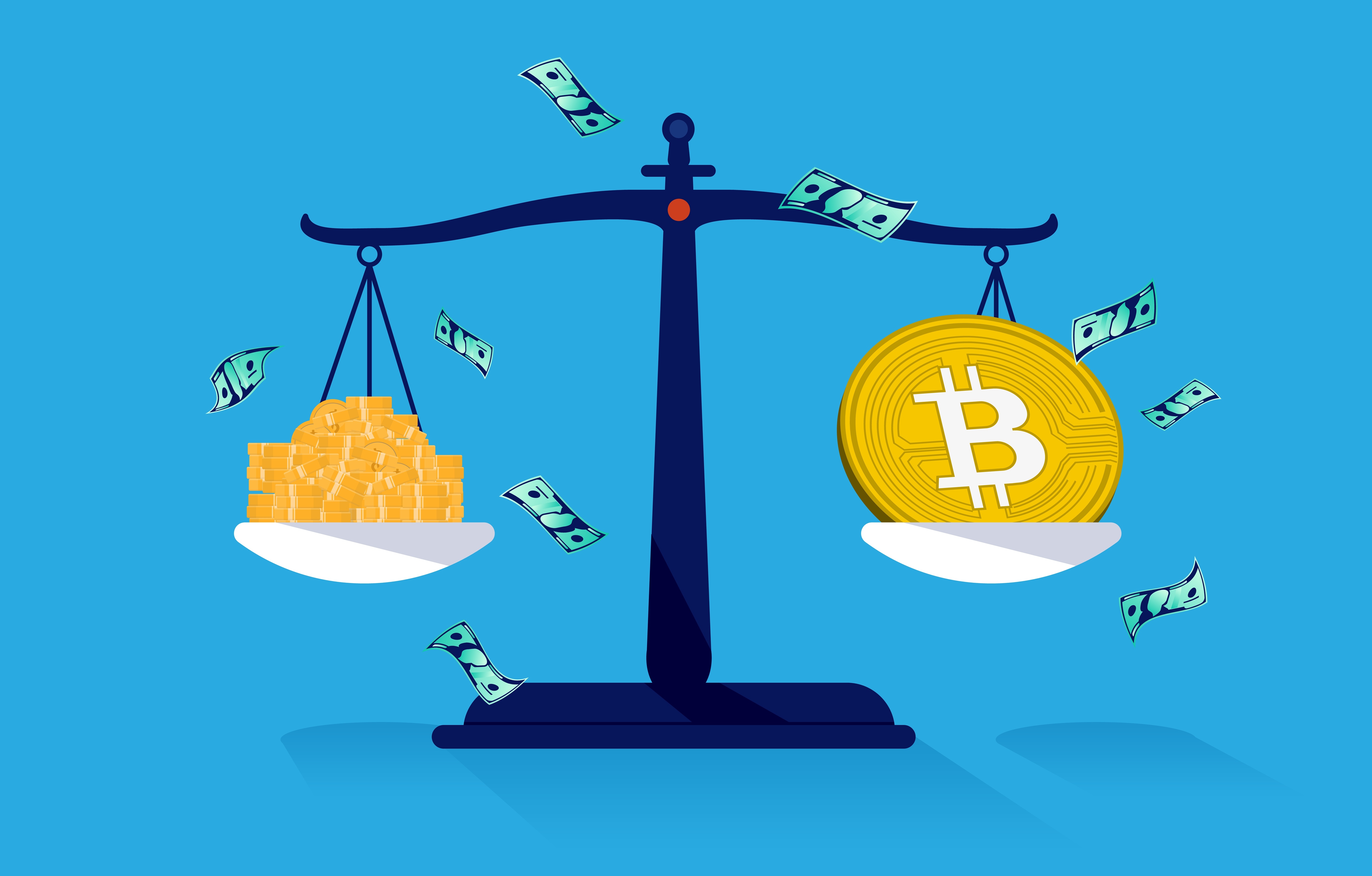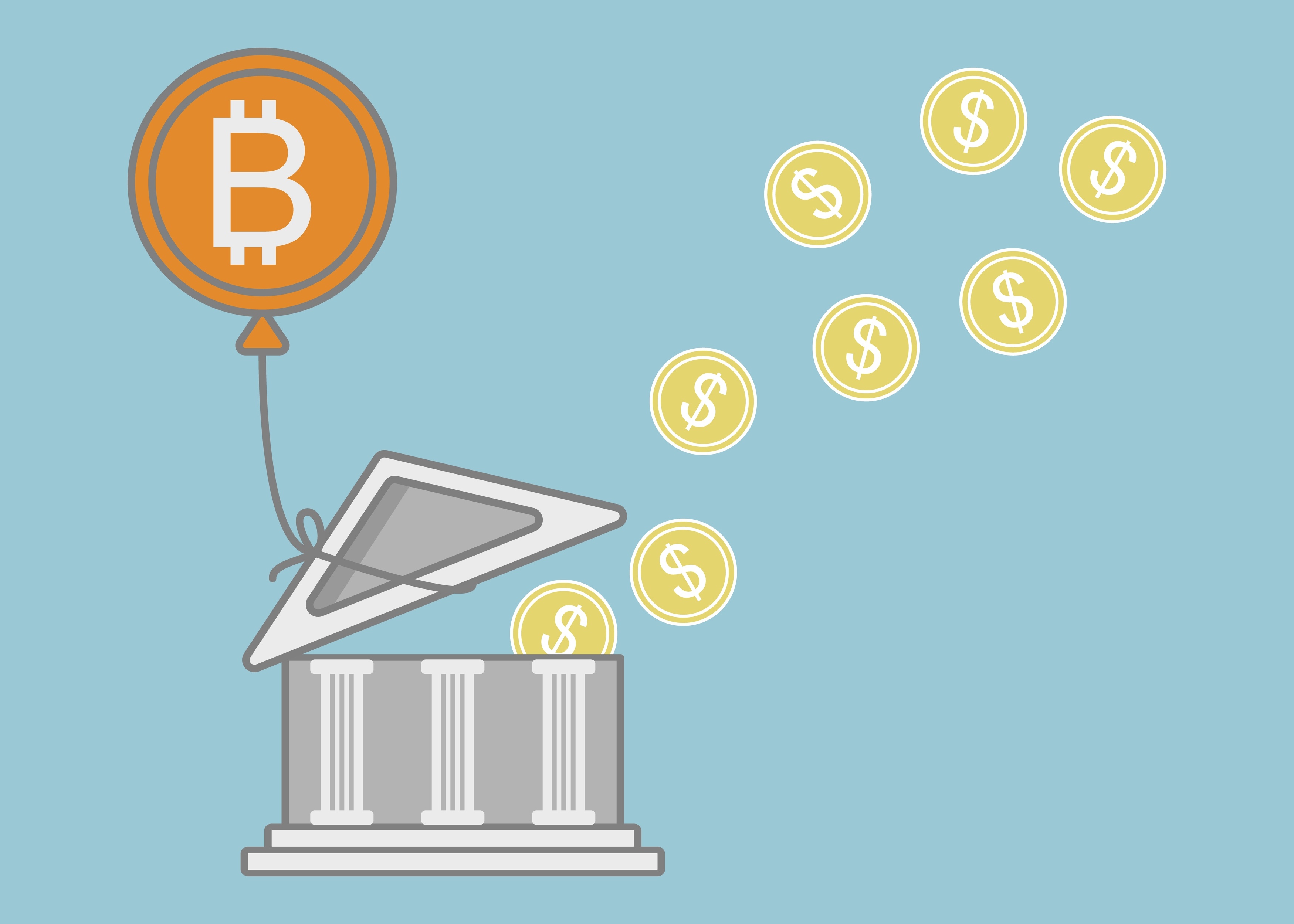Can Bitcoin or Any Other Cryptocurrency Replace Fiat Money?

The world of finance and monetary systems is undergoing a major transformation with the rise of cryptocurrencies like Bitcoin. The decentralized, digital currency has sparked discussions and debates on its potential to replace the traditional fiat money we are all familiar with. However, what exactly is Bitcoin and how has it gained such popularity in a short amount of time? This article aims to answer these questions and examine the possibility of Bitcoin or any other cryptocurrency taking the place of fiat money. Through an exploration of the advantages and limitations of cryptocurrencies, we will weigh the arguments for and against their potential as a replacement for fiat currency. So let’s dive into the fascinating world of Bitcoin and cryptocurrency and discover what the future may hold for our monetary systems.

What is fiat money?
Fiat money(example USD, EUR, CAD…) is a form of currency that is accepted as a medium of exchange by a government. It is not backed by any tangible asset, such as gold or silver, but rather by the faith and credit of the issuing government. Fiat money has been used for centuries, and it is the most common form of currency in the world today.
Fiat money is created by a government in response to an increase in demand for money. Governments create fiat money by issuing currency notes or coins, which are then accepted as legal tender. This form of currency is typically backed by a government’s promise to pay, which is known as legal tender. Fiat money also serves as a store of value, which means it can be used to purchase goods and services.
The primary advantage of fiat money is that it allows a government to control the money supply and manage the economy. By controlling the money supply, a government can influence the prices of goods and services, and encourage economic activity. Fiat money also allows a government to finance public projects and cover government deficits.
The downside of using fiat money is that it can be subject to inflation if the government prints too much money. Inflation occurs when the value of money decreases due to an increase in the money supply. It has the effect of raising prices and reducing the purchasing power of a given currency.
Overall, fiat money is a useful tool for governments to manage the economy and finance public projects. It is important to understand the pros and cons of using fiat money so that governments can make informed decisions about their money supply.

What is Bitcoin or Cryptocurrency?
Cryptocurrency, such as Bitcoin, is digital money that utilizes cryptography to secure and verify the transfer of funds. It is a decentralized form of currency, meaning that it is not issued or regulated by a central authority such as a government or bank. Instead, cryptocurrency transactions are verified by a peer-to-peer network of computers. This allows for low transaction fees and greater anonymity compared to traditional payment methods. Cryptocurrency can be used as an investment, a form of payment, and a store of value.
Bitcoin is the first and most widely-known cryptocurrency. It was created in 2009 by an unknown person or group of people using the pseudonym Satoshi Nakamoto. Bitcoin is an open-source project and its source code can be seen and used by anyone. It is a decentralized digital currency, meaning that it is not regulated by a central authority such as a government or bank.
The main advantages of using cryptocurrency, such as Bitcoin, are its low transaction fees, its global reach, and its anonymous nature. Transactions are fast and secure, as they are done without the need for a third party. Additionally, cryptocurrency is not subject to inflation, since there is no central authority controlling the supply of coins.
For those looking to invest in cryptocurrency, it is important to do research and understand the risks involved. Cryptocurrency is a volatile asset and prices can fluctuate drastically. It is also important to remember that cryptocurrency is not insured by the FDIC or any other government agency, so it is important to store your coins securely in a wallet.
Cryptocurrency, such as Bitcoin, is becoming increasingly popular and accepted as a form of payment. As more and more people become aware of the advantages of using cryptocurrency, its popularity is likely to continue to grow. With its low transaction fees, global reach, and anonymous nature, it is easy to see why cryptocurrency is becoming such a popular form of payment.

The Rise of Cryptocurrencies
Have you ever wondered why cryptocurrencies have captured the world’s attention? It’s not just about the money; it’s about a new way of thinking. A shift from traditional financial systems to something that feels more aligned with the digital age we live in. Let’s take a look at how this all started and why so many people are getting on board.
Bitcoin’s Beginnings
Back in 2009, an unknown person (or group) using the name Satoshi Nakamoto introduced Bitcoin to the world. It wasn’t just another form of digital money; it was a revolutionary idea. Bitcoin was built on principles like decentralization, meaning no single entity controls it, and a limited supply capped at 21 million coins. These features were designed to address issues seen in traditional fiat money, like inflation and central control.
I remember when I first heard about Bitcoin—it was exciting and a bit confusing. The idea that you could have a currency not controlled by any government felt like a scene out of a sci-fi movie. But it was real, and it was growing.
The Appeal of Digital Currency
So, what makes cryptocurrencies so appealing? For starters, they’re built on blockchain technology, which offers a high level of security. Transactions are recorded on a distributed ledger that’s nearly impossible to tamper with. This gives people confidence that their money is safe.
Privacy is another big draw. Unlike traditional bank transactions, which can be traced and monitored, crypto transactions can be more discreet. This doesn’t mean it’s all about shady dealings; many folks just appreciate a bit more privacy in their financial lives.
Then there’s the potential for growth. Early adopters of Bitcoin saw their investments skyrocket. While the market is volatile, the possibility of high returns continues to attract people. It’s not guaranteed, but the opportunity is there.
“It’s not about the money. It’s about sending a message.” – The Joker
Okay, maybe quoting a comic book villain is a bit dramatic, but it captures the sentiment. For many, investing in cryptocurrencies is about being part of a movement challenging traditional financial norms.
Other Notable Cryptocurrencies
While Bitcoin grabbed the spotlight, it’s not the only player in the game. Ethereum came onto the scene with smart contracts, enabling developers to build decentralized applications (dApps) on its platform. This opened up a world of possibilities beyond just currency.
Tether offers something different—a stablecoin tied to the value of traditional currencies like the US dollar. It’s designed to minimize volatility, making it a popular choice for those who want to dip their toes into crypto without the wild price swings.
Then there’s Solana, known for its high-speed transactions and scalability. It’s tackling some of the technological limitations faced by other cryptocurrencies, aiming to make crypto more practical for everyday use.
These are just a few examples, but there are thousands of cryptocurrencies out there, each with its unique features and purposes. It’s an ever-evolving landscape, and it’s fascinating to watch it grow.
But with so many options and rapid changes, it begs the question: What does the future hold for Bitcoin and these emerging competitors? Could another cryptocurrency take the lead?

The Limitations of Fiat Money
Fiat money, the paper bills and coins we’re all familiar with, has been the backbone of our economy for centuries. But it’s not without its flaws. Here are some significant issues that come with using traditional fiat currencies:
The Problem of Inflation
Inflation is like a slow leak in the value of our money. Over time, the purchasing power of fiat currency decreases, meaning the same amount of money buys you less than it used to. Remember when a loaf of bread cost a fraction of what it does today? That’s inflation at work.
For those trying to save money, inflation can feel like swimming against the tide. You might put away cash for years, only to find that it doesn’t go as far as you’d hoped when you finally need it.
Centralized Control and Trust Issues
Fiat currencies are controlled by governments and central banks. This centralization means a small group makes decisions that affect everyone’s money. Interest rates, money printing, and other financial policies are out of our hands.
In times of economic uncertainty, this can lead to mistrust. If people feel that their government is mishandling the economy, confidence in the currency can plummet. Just think about countries that have experienced hyperinflation due to excessive money printing.
Lack of Privacy in Transactions
Ever noticed how buying something with your credit or debit card leaves a trail? Banks and financial institutions can track every transaction you make. While this can be convenient for budgeting apps, it also means there’s a record of your spending habits.
For those who value privacy, this oversight can be uncomfortable. There’s a growing concern about how much of our personal information is accessible and who might be watching our financial moves.
These limitations make me wonder: Could there be a better way to handle money? Is there an alternative that addresses these issues? Stick around as we explore how cryptocurrencies might offer solutions to these problems.
Use cases where Bitcoin or any other cryptocurrencies outperforms fiat money?
Cryptocurrencies such as Bitcoin have the potential to offer better financial services than traditional fiat money in certain use cases. Here are a few ways in which cryptocurrencies can outperform fiat money:
- Speed and Efficiency: Cryptocurrencies are much faster than traditional money transfers. Transactions can be completed within minutes compared to days or even weeks for traditional money transfers. Cryptocurrencies also reduce the need for intermediaries. This leads to a more efficient system with fewer fees and charges.
- Security and Privacy: Cryptocurrencies offer a much higher level of security and privacy than fiat money. Transactions are secured by cryptography, which is much more secure than traditional payment systems. Furthermore, the use of a public ledger ensures transparency and accountability.
- Global Reach: Cryptocurrencies allow for global transactions with no need for foreign exchange. This means sending money abroad is as easy as sending it locally. This makes it much easier to do business with people from different countries and regions.
- Low Transaction Fees: Cryptocurrencies are decentralized, which means there are no transaction fees or processing charges. This makes them much cheaper than traditional money transfers.
- Accessibility: Cryptocurrencies allow anyone with an internet connection access to the global financial system. This is particularly beneficial to those in countries with limited access to traditional financial services.
Cryptocurrencies offer a wide range of advantages over traditional fiat money. They are faster, more secure, and more cost-effective. Furthermore, they offer global access and improved privacy. For these reasons, cryptocurrencies offer distinct advantages over traditional fiat money in certain use cases.

General advantages of Cryptocurrency over Fiat Money
Cryptocurrencies have garnered a lot of attention in recent years due to their numerous advantages over traditional fiat money. One of the main advantages of cryptocurrencies is their decentralized nature. Unlike fiat currencies which are controlled by central banks and governments, cryptocurrencies are not tied to any central authority. This means that the power over the currency lies in the hands of the users and not any central governing body. This is a stark contrast to fiat money, which can be subject to government manipulation and control.
Another advantage of cryptocurrencies is increased security and anonymity. Cryptocurrency transactions are encrypted and processed through a decentralized network, making them much more secure than traditional financial transactions. Additionally, users can make transactions anonymously, offering a level of privacy not available with fiat money.
Another benefit of cryptocurrencies is reduced transaction costs and fees. Since cryptocurrencies do not require intermediaries like banks to process transactions, they can be processed much more efficiently and at a lower cost. This makes them a more cost-effective option compared to traditional fiat money transactions which often come with high fees and charges.
Finally, cryptocurrencies offer the advantage of borderless transactions. With cryptocurrencies, users can make transactions from anywhere in the world without the need for intermediaries or currency conversion. This makes cross-border transactions much faster, cheaper, and more efficient compared to traditional fiat money transfers.
These are just some of the advantages of cryptocurrencies over fiat money. From decentralization to increased security and lower costs, cryptocurrencies offer a number of benefits that make them an attractive option for both individuals and businesses alike.

Some limitations of Cryptocurrency as a Replacement for Fiat Money
While cryptocurrencies have a number of advantages over fiat money, they also come with their own set of limitations that prevent them from being a replacement for fiat currency. One of the main limitations of cryptocurrencies is their volatility and price instability. The value of cryptocurrencies is often subject to significant fluctuations and unpredictability, making them an unreliable store of value. This makes it difficult for individuals and businesses to use cryptocurrencies as a replacement for fiat money.
Another limitation of cryptocurrencies is the lack of widespread adoption and acceptance. Despite the growing popularity of cryptocurrencies, they are still not widely used or accepted as a means of payment. This means that users may face difficulty using cryptocurrencies for everyday transactions and that there are still limited options for converting cryptocurrencies into fiat money.
Additionally, cryptocurrencies have limited use cases compared to fiat money. While they can be used for cross-border transactions and as a store of value, they are not yet widely used for day-to-day transactions and are not accepted by many merchants and service providers.
Finally, regulatory challenges pose a significant limitation to the adoption and use of cryptocurrencies as a replacement for fiat money. Cryptocurrency regulations vary widely across countries and there is a lack of a clear and consistent regulatory framework. This makes it difficult for businesses and individuals to use cryptocurrencies with confidence and can limit their potential for growth and adoption.
While cryptocurrencies have many advantages over fiat money, their limitations prevent them from being a replacement for traditional currencies at this time. From volatility and instability to limited use cases and regulatory challenges, there are still significant hurdles to overcome before cryptocurrencies can take the place of fiat money.

Comparison of Bitcoin and fiat money
As I sit here reflecting on the evolution of money, I’m struck by how drastically things have changed—and how quickly. From coins and paper bills to digital transactions and now to cryptocurrencies, the way we perceive and use money is shifting beneath our feet. Let’s explore some of the key differences between cryptocurrencies and traditional fiat money that have caught my attention.
The comparison between Bitcoin and fiat money is a topic of much debate in the financial world. While both have their advantages and limitations, there are key differences between the two that make them unique. When examining the comparison between Bitcoin and fiat money, it is important to consider functionality and usability, stability and security, adoption and acceptance, and regulation and legal status.
Stability vs. Volatility
When we think about fiat money, like the US dollar or the euro, we typically consider it stable. Sure, inflation can erode its value over time, but on a day-to-day basis, a dollar is a dollar. Cryptocurrencies, however, are a different story. They can fluctuate wildly in value in a matter of hours.
Take Bitcoin, for example. In 2017, it soared from under $1,000 to nearly $20,000, only to crash back down in the following months. More recently, we’ve seen similar volatility. This kind of unpredictability can be exhilarating for investors but nerve-wracking for those who want a reliable store of value.
Imagine if your paycheck could be worth 20% less (or more) by the time you spend it! This volatility makes cryptocurrencies challenging to use as everyday money right now. It’s like riding a financial roller coaster—you never quite know what’s around the corner.
Acceptance and Usability
Fiat money enjoys universal acceptance. You can walk into just about any store or service provider, hand over your cash or card, and complete a transaction without a hitch. It’s a seamless experience that we’ve all come to expect.
Cryptocurrencies are making strides in this area, but they’re not there yet. While some retailers and online platforms accept Bitcoin and other digital currencies, they’re still in the minority. According to a 2020 HSB survey, only about 36% of small to medium-sized businesses in the US accept cryptocurrency payments.
- Limited merchants accept crypto
- Transaction times can be longer
- Conversion back to fiat may be necessary
This limited acceptance means that, for now, cryptocurrencies complement rather than replace fiat money in most people’s wallets.
Control and Decentralization
One of the most profound differences lies in who controls the currency. Fiat money is centralized. Governments and central banks dictate monetary policy, control the money supply, and can influence economic conditions through their decisions.
Cryptocurrencies, on the other hand, are decentralized. They operate on blockchain technology, which means no single entity has control. Transactions are verified by a network of users, and the ledger is transparent and immutable.
This decentralization has a certain appeal. It offers a way to sidestep traditional financial institutions and gives individuals more direct control over their assets. As someone who values financial autonomy, I find this aspect of cryptocurrencies particularly compelling.
The Emotional Angle
There’s an old saying that resonates with me:
“Money is a tool. Used properly it makes something beautiful; used wrong, it makes a mess!”
The emergence of cryptocurrencies challenges us to rethink our relationship with money. It stirs a mix of excitement, curiosity, and, let’s be honest, a bit of apprehension.
We stand at a crossroads where we can either embrace new technologies that empower us or cling to traditional systems that feel safe and familiar. It’s a thrilling, yet uncertain, time to be involved in this space.
But here’s the big question: With all these differences, is it practical to use cryptocurrencies over fiat money in our daily lives? How do transaction speeds, fees, and accessibility stack up when we put crypto to the test? I’ve been curious about this myself, and I think it’s time we dive into that topic. Trust me, what I’ve found might surprise you.

Future of Cryptocurrency as a Replacement for Fiat Money
The future of cryptocurrency as a replacement for fiat money is a topic of much debate and speculation. While some experts predict that cryptocurrencies will eventually replace fiat money, others believe that they will continue to exist as a complementary form of payment. The truth is that the future of cryptocurrency is uncertain and will depend on several factors, including predictions and expert opinions, current trends and developments, and challenges and opportunities.
In terms of predictions and expert opinions, there is a range of views on the future of cryptocurrency. Some experts believe that cryptocurrencies will eventually become the dominant form of payment, while others believe that they will continue to exist as complementary forms of payment. There are also those who believe that cryptocurrencies will eventually fade into obscurity as new, more advanced technologies emerge.
Current trends and developments are also important to consider when examining the future of cryptocurrency. The growing popularity of cryptocurrencies and the increasing number of businesses accepting them as a form of payment are positive developments for the future of cryptocurrency. However, regulatory challenges and the lack of widespread adoption and acceptance are hurdles that must be overcome for cryptocurrency to replace fiat money fully.
Finally, challenges and opportunities must also be considered when examining the future of cryptocurrency. While regulatory challenges and the lack of widespread adoption are significant hurdles, there are also opportunities for the growth and development of cryptocurrency. For example, the increasing use of blockchain technology and the development of new cryptocurrencies that offer more functionality and usability could lead to wider adoption and acceptance of cryptocurrency as a replacement for fiat money.
Cryptocurrency as a replacement for fiat money is uncertain and will depend on a range of factors. While there are challenges to overcome, the growing popularity of cryptocurrencies and the increasing number of businesses accepting them as a form of payment are positive developments for the future of cryptocurrency. As the financial world continues to evolve, the role of cryptocurrency as a replacement for fiat money is a topic that will continue to be watched closely.

Will Bitcoin Be Replaced by Another Cryptocurrency?
Sometimes I find myself pondering an intriguing question: Could Bitcoin, the pioneer of the crypto world, ever be overtaken by another digital currency? It’s a thought that sparks both excitement and curiosity, especially as new and innovative cryptocurrencies emerge on the scene.
Bitcoin’s Strong Position
First off, let’s acknowledge Bitcoin’s powerhouse status. Being the first of its kind, Bitcoin has a first-mover advantage that’s hard to ignore. It’s the name that most people associate with cryptocurrency, and for many, it’s their initial introduction to the concept of digital money. Bitcoin’s widespread recognition isn’t just among tech enthusiasts; it’s talked about by financial analysts, featured in mainstream media, and even accepted by some major companies as a form of payment.
The fact that Bitcoin has a limited supply of 21 million coins adds to its allure. This scarcity can drive demand and, in turn, its value. It’s often referred to as “digital gold” because, like gold, it’s considered by some as a store of value. Its established network and the security that comes with its proof-of-work system further solidify its standing.
Emerging Competitors
However, the crypto landscape is evolving rapidly. Competitors like Ethereum and Solana are not just gaining ground; they’re pushing the boundaries of what’s possible with blockchain technology. Ethereum introduced the concept of smart contracts, enabling decentralized applications (dApps) that go beyond simple transactions. This innovation has opened doors to decentralized finance (DeFi), non-fungible tokens (NFTs), and more.
Solana is another contender that’s making headlines. Known for its high-speed transactions and scalability, Solana addresses some of the limitations that have plagued Bitcoin and even Ethereum. With the ability to process thousands of transactions per second at a fraction of the cost, it’s attracting developers and investors who are looking for efficient and cost-effective solutions.
These emerging cryptocurrencies are not just alternatives; they’re building ecosystems with unique features and use-cases that challenge Bitcoin’s dominance.
Factors That Could Lead to a Shift
So, what would it take for another cryptocurrency to replace Bitcoin at the top? There are several factors that could contribute to such a monumental shift:
- Technological Innovation: A cryptocurrency that offers superior technology—be it faster transaction speeds, better scalability, or enhanced security—could sway users and investors.
- Utility and Functionality: Cryptocurrencies that provide additional functionalities, like smart contracts or interoperability between different blockchains, may become more appealing for practical applications.
- Community and Developer Support: A strong community and active development can drive adoption. Open-source projects that encourage collaboration often see rapid growth and improvement.
- Regulatory Environment: Changes in government policies could impact Bitcoin’s position. For instance, if certain cryptocurrencies are favored due to environmental concerns or compliance with regulations, this could alter the market dynamics.
- Public Perception and Trust: Trust plays a crucial role. If a cryptocurrency can demonstrate reliability and gain public confidence, it might attract a broader user base.
As famed futurist Alvin Toffler once said:
“The illiterate of the 21st century will not be those who cannot read and write, but those who cannot learn, unlearn, and relearn.”
This quote feels particularly relevant in the fast-paced world of cryptocurrencies. Staying adaptable and open to new possibilities is key.
The idea of Bitcoin being replaced isn’t far-fetched. History has shown us that technology leaders can be unseated when innovators introduce better solutions. Just think about how smartphones replaced not only flip phones but also a host of other gadgets.
But what does this mean for the future of money? Could the rise of these new cryptocurrencies signal even bigger changes ahead?
The Practicality of Using Crypto Over Fiat
Have you ever tried to buy a coffee with Bitcoin? Trust me, it’s not as sci-fi as it sounds. Cryptocurrencies are becoming a part of our daily conversations, but are they practical enough to replace the dollars and euros we’re so used to? Let’s dive into what it’s like to use crypto in the real world and see if it measures up to the cash in our pockets.
Transaction Speed and Fees
I remember the first time I sent money overseas through a bank. It took days and the fees were, well, less than friendly. With cryptocurrencies, transactions can be completed in minutes, sometimes even seconds, regardless of where you’re sending money. For example, sending Litecoin to someone across the globe can be faster and cheaper than traditional wire transfers.
But it’s not all sunshine and rainbows. Networks like Bitcoin can get congested, leading to higher fees and longer wait times. Just last year, during a surge in Bitcoin’s popularity, average transaction fees spiked to over $60! That’s not exactly pocket change. On the flip side, newer cryptocurrencies like Nano offer feeless and instant transactions, showing that the crypto world is actively working on these issues.
Accessibility and Ease of Use
I’ll be honest—getting started with crypto can feel like learning a new language. Wallets, private keys, exchanges—it can be overwhelming. But the industry’s making strides to be more user-friendly. Apps like Coinbase and Binance have simplified the process, allowing you to buy crypto with a few taps on your phone.
Yet, for many people, the idea of managing digital wallets is still intimidating. Not everyone is comfortable with technology, and losing access to a wallet can mean losing your funds forever. Remember the story of the guy who lost his Bitcoin wallet password and forfeited millions? It’s a stark reminder that while crypto offers freedom, it comes with responsibility.
Security Concerns
Security is a double-edged sword in the crypto world. On one hand, blockchain technology is incredibly secure. On the other, if you’re not careful, you could be vulnerable to hacks and scams. Just this year, there have been multiple instances where hackers stole millions from crypto exchanges.
But don’t panic. By using reputable wallets and following basic security practices, like enabling two-factor authentication, you can significantly reduce the risks. It’s similar to keeping your wallet safe in the physical world—you need to be cautious and aware of your surroundings.
“With great power comes great responsibility.” – Uncle Ben, Spider-Man
This quote rings true when it comes to handling cryptocurrencies. You have more control over your money, but it also means you need to take charge of keeping it safe.
So, is crypto practical for everyday use? It’s getting there, but we’re not quite at a point where it’s as seamless as pulling out a credit card. But who knows what the future holds? Speaking of which, ever wondered how you can turn your crypto back into cash when you need it? Let’s explore that next!
Converting Crypto to Fiat Money
“The future of money is digital currency.” – Bill Gates
Ever found yourself wondering how to turn your cryptocurrency into cash you can hold? I’ve been there, scratching my head over how to bridge the gap between the digital and the tangible. Let’s explore the ways you can convert your crypto into fiat money, making it as accessible as any traditional currency.
Using Centralized Exchanges
One of the most straightforward methods is through centralized exchanges like Coinbase or Binance. These platforms act as intermediaries, allowing you to sell your cryptocurrency for fiat money.
Here’s how it typically works:
- Create an Account: Sign up on the exchange and complete any necessary identity verification.
- Deposit Your Crypto: Transfer your cryptocurrency to your exchange wallet.
- Sell for Fiat: Place a sell order, choosing the amount and type of fiat currency you want.
- Withdraw Funds: Once the sale is complete, withdraw the fiat money to your bank account.
These exchanges offer convenience and are user-friendly, especially for those new to crypto. However, they may charge fees and require you to trust a third party with your assets.
Bitcoin ATMs and Other Methods
Imagine walking up to an ATM and withdrawing cash directly from your crypto wallet. Sounds futuristic, right? But with Bitcoin ATMs, it’s a reality. These machines allow you to convert Bitcoin into cash on the spot.
Using a Bitcoin ATM involves:
- Finding an ATM: Use online maps to locate a Bitcoin ATM near you.
- Scanning Your Wallet: Scan your wallet’s QR code using the machine.
- Confirming the Transaction: Enter the amount you wish to convert and confirm.
- Collecting Cash: The machine dispenses the equivalent amount in fiat money.
Other methods include:
- Crypto Debit Cards: Services like the Crypto.com Visa Card let you spend your crypto anywhere that accepts traditional debit cards, seamlessly converting it at the point of sale.
- Over-the-Counter (OTC) Trading: For large transactions, OTC services facilitate direct trades between buyers and sellers, often with personalized service.
These options offer flexibility but may come with higher fees or less favorable exchange rates. It’s always a good idea to compare methods to see what works best for you.
Peer-to-Peer Marketplaces
If you prefer a more personal touch, peer-to-peer (P2P) marketplaces like LocalBitcoins or Paxful connect you directly with others looking to trade. This method can offer more control over the transaction and potentially better rates.
Here’s how you can get started:
- Choose a Platform: Sign up on a reputable P2P marketplace.
- Find a Trade Partner: Browse listings or post your own offer detailing the amount and preferred payment method.
- Communicate Directly: Chat with potential buyers or sellers to negotiate terms.
- Use Escrow Services: Most platforms provide escrow to secure the transaction until both parties are satisfied.
P2P trading allows for a variety of payment methods, including bank transfers, PayPal, or even cash in person. However, it’s crucial to exercise caution and follow safety guidelines to protect yourself from potential scams.
Converting crypto to fiat money doesn’t have to be a maze of confusion. With these methods at your fingertips, turning your digital assets into tangible cash is easier than ever. But as seamless as this process is becoming, it raises a question: What challenges might we face as cryptocurrencies edge closer to mainstream adoption? Let’s take a look at the obstacles that could shape the future of money.

Challenges in Replacing Fiat Money with Crypto
Ever thought about how amazing it would be if we could all just switch over to using crypto instead of traditional money? Sounds exciting, right? But as with any big change, there are some roadblocks along the way. Let’s take a look at what stands in the way of cryptocurrencies becoming the new norm.
Regulatory Hurdles
One of the biggest obstacles is the way governments around the world are handling cryptocurrencies. Since crypto operates outside traditional financial systems, many authorities are unsure about how to regulate it. This uncertainty can lead to strict laws that make it hard for people to use or invest in crypto. For example, China has cracked down on crypto trading and mining, making it nearly impossible for residents to participate.
On the flip side, countries like Switzerland and Malta are embracing crypto with friendly regulations, hoping to become hubs for blockchain innovation. The difference in governmental approaches can make it confusing and risky for users and businesses alike.
Technological Limitations
Another challenge is the technology itself. While blockchain is groundbreaking, it’s not perfect. Take Bitcoin, for example. It can process about 7 transactions per second, which is nothing compared to Visa’s ability to handle up to 24,000 transactions per second. This scalability issue means that if everyone started using Bitcoin, the system could get overloaded.
Then there’s the energy problem. Mining cryptocurrencies like Bitcoin requires a huge amount of electricity. Some studies estimate that Bitcoin’s annual energy consumption is comparable to that of entire countries like Argentina. This not only raises environmental concerns but also questions about sustainability.
Public Perception and Trust
Let’s be honest, not everyone is on board with crypto. Many people find it confusing or even scary. Headlines about hacks, scams, and wild price swings can make cryptocurrencies seem like a risky gamble rather than a viable alternative to money. This skepticism can prevent people from giving crypto a try.
Trust is essential when it comes to money. With fiat currency, people trust the government and banks to manage the system. With crypto, that trust needs to shift to the technology and the community. That’s a big leap for a lot of folks, especially when they don’t fully understand how it all works.
Despite these challenges, the world of finance is changing rapidly. Could there be a middle ground that combines the best of both worlds? Maybe a future where crypto and traditional money work together seamlessly? Stick around, because we’re about to explore that possibility next!

The Possibility of a Hybrid Financial System
I’ve been thinking a lot lately about how the future of money might look. Could there be a world where cryptocurrencies and traditional fiat money coexist harmoniously? It seems more and more likely as we see developments that blend the best of both worlds.
Central Bank Digital Currencies (CBDCs)
One of the most intriguing developments is the rise of Central Bank Digital Currencies. Governments around the globe are exploring the idea of creating their own digital money. Imagine a digital dollar or euro that’s backed by the government but operates on a technology similar to cryptocurrencies.
Countries like China are already testing digital versions of their currency, and others are not far behind. These CBDCs aim to provide the convenience and speed of crypto transactions while maintaining the stability and trust associated with traditional money.
Integration with Existing Systems
Another exciting prospect is how crypto technology can enhance the financial systems we already use. Banks and financial institutions are starting to adopt blockchain technology to make transactions faster, more secure, and more transparent.
For instance, cross-border payments, which used to take days and incur hefty fees, can now be processed in minutes using crypto technology. This integration doesn’t mean replacing fiat money entirely but improving how we use it.
Resources to Learn More
If you’re as curious as I am about where all this is heading, there’s a wealth of information out there. Staying informed is key to understanding these changes. I regularly share updates and reviews on the latest developments over at Cryptolinks.com. It’s a great place to keep up with what’s new in the world of crypto and how it might affect us all.
As we navigate this evolving landscape, it’s natural to wonder how these changes will impact our daily lives. Will we be paying for our morning coffee with crypto or a digital version of our local currency? The possibilities are exciting, and there’s so much more to explore.
Ever thought about what all this means for the future of money? Well, you’re not alone. In the next part, I’ll share my personal take on where we might be headed. Trust me; you won’t want to miss it!
So, Can Cryptocurrencies Replace Fiat Money?
After exploring the ups and downs of both fiat money and cryptocurrencies, I find myself pondering the big question: Are we on the brink of a financial revolution where digital currencies take over traditional money? It’s a complex issue with many facets, but let’s take a moment to consider what the future might hold.
My Thoughts on the Future of Money
I genuinely believe that cryptocurrencies have the potential to transform the way we think about and use money. The idea of a decentralized currency that’s not controlled by any government or central authority is incredibly appealing, especially in a world where trust in traditional institutions is often shaken. Bitcoin, with its limited supply and strong security protocols, offers an alternative that’s hard to ignore.
However, there are still significant hurdles to overcome. Volatility remains a major concern; it’s tough for people to rely on a currency that can swing wildly in value overnight. Plus, the technical barriers can be intimidating for newcomers. But as technology improves and more people become educated about crypto, these challenges may diminish.
What It Means for You
So what does all this mean for everyday folks like us? Well, if cryptocurrencies do become more mainstream, it could change how we handle everything from paying bills to saving for the future. Imagine being able to transfer money instantly across the globe with minimal fees, or having greater control over your financial privacy.
On the flip side, it also means we’ll need to adapt and learn new ways of managing our finances. Keeping up with security practices, understanding market trends, and staying informed about regulations will become even more important. It’s an exciting prospect, but it comes with responsibilities.
Staying Informed Is Key
The world of crypto is evolving at lightning speed. New coins emerge, regulations change, and technologies advance. To navigate this landscape, staying informed is essential. Whether you’re a seasoned investor or just curious, keeping up with the latest news and developments can help you make smarter decisions.
I recommend checking out reputable sources, joining online communities, and maybe even participating in local meetups. Websites like Cryptolinks.com offer a wealth of resources to get you started. Remember, knowledge is power, especially in the realm of digital currencies.
Final Thoughts
In the end, whether cryptocurrencies will fully replace fiat money remains to be seen. It might be that they coexist, each serving different needs and preferences. What’s clear is that they’re reshaping our financial landscape in significant ways.
Thanks for joining me on this journey through the possibilities of crypto and fiat money. I hope it’s given you some food for thought. Feel free to share your own views and experiences—I always enjoy hearing from others who are exploring this fascinating world.
